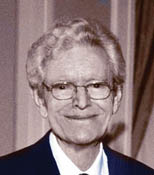The University of Texas Medical Branch at Galveston

What do a Houston doctor, the Canadian physician he admired, and an academic health center on Galveston Island have in common? All three have championed the notion that a physician's principal tenet should be dedication to providing humane, compassionate care.
For decades, Houston allergist Dr. John McGovern has been a staunch supporter of The University of Texas Medical Branch (UTMB) and activities that foster caring relationships between physicians and their patients. A few months after UTMB's President John Stobo arrived from Johns Hopkins in 1997, McGovern learned they shared a role model, Sir William Osler. Stobo had held the William Osler Professorship in Medicine at Hopkins.
Osler (1849-1919) was a Canadian doctor who pioneered many innovative approaches to teaching clinical medicine, most notably advocating the cause of compassionate, patient-centered care. Above all, Osler stressed the importance of caring and of strong ethical principles for aspiring physicians.
McGovern became the principal founder of the American Osler Society in 1969 after noticing an alarming trend. "At schools everywhere, the pendulum was swinging toward research," he explained. "Medical science is great. It gives us wonderful new tools we can use to help patients. But I could see that the relationship between the physician and the patient was getting attenuated."
 |  | | Dr. John McGovern |
With the friendship forged between McGovern and Stobo, the two began discussing the possibility of McGovern supporting the creation of a program aimed at integrating Osler explicitly into UTMB's institutional culture. In a way the effort was an extension of initiatives in patient-centered education the university had begun before Stobo's arrival, such as the Integrated Medical Curriculum, which grounds medical science in clinical contexts and begins students' training in the human dimension of care in the first week of medical school.
In 2001, McGovern provided the first of three generous contributions to endow the John P. McGovern, M.D., Academy of Oslerian Medicine. The John P. McGovern Academy of Oslerian Medicine endowment is invested in the Long Term Fund and has a market value of $6.4 million as of August 31, 2004. Six faculty were selected for their history of modeling and teaching compassionate, patient-centered care and given the title of Osler Scholars. Distributions from the endowment support them as they undertake individual projects promoting Oslerian ideals, teach electives in Oslerian medicine, confer student essay awards and scholarships (among UTMB's most valuable), and bestow annually the John P. McGovern, M.D., Award in Oslerian Medicine-a career achievement award-to a faculty member. Every two months, the scholars also host a campuswide meeting of the university's Osler Club, featuring a presentation and discussion related to Osler's teachings.
Stobo said the academy helps demonstrate UTMB's commitment to the highest standards of patient care. "Dr. McGovern's vision is helping us ensure that future generations of physicians will be trained to treat their patients with the utmost care and respect."
Since establishing the academy, McGovern has twice made additional contributions to the endowment, increasing the number of Osler Scholars in the academy to eight as well as increasing to 12 the number of scholarships for medical students who demonstrate Osler's compassionate ideals. McGovern's commitments will additionally allow the Osler Scholars to confer awards to faculty who have demonstrated excellence in bedside teaching, a practice that Osler returned to prominence after 19th century medical education had become dominated by lectures and laboratory work.
|